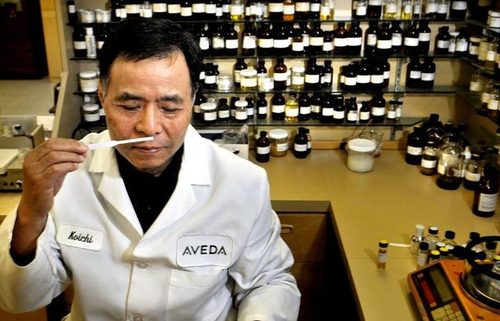Organic-Grade Solvent is the New Holy Grail for Aveda & a Note on Organic vs. Natural {The 5th Sense in the News} {Green Products}

Here is an article about Aveda's senior perfumer Ko-Ichi Shiozawa. It touches upon the difficulty he currently experiences producing wholly desirable organic perfumes in a competitive market that has an increasing demand for such scents seen as ideals of cleanliness, greenness and purity. It is no mere chance if the Aveda perfumes are titled "Pure-Fume".
For Shiozawa it mainly seems to be a critical problem with finding an organic-grade solvent (see for comparison the issue that was raised around tap water being used by Bayliss Ranch as a so-called "organic" ingredient). For the President of Aveda Dominique Conseil it is about investing in a higher proportion of organically-certified ingredients, passing from 25% to more than 90% for the new generation of Aveda products (no further precision added).
According to organic certification grades recognized and controled by the USDA, if it is less than 95% - 70 to 94% - the products can be called "Made with Organic Ingredients" as opposed to the next level, "Certified Organic", i.e., 95% or higher. The highest organic grade is "100% Certified Organic". The lowest grade is found at below 70% and the product then cannot be called "organic", only the relevant ingredients...
"Organic" is a term that is legally regulated, even if sometimes to the dissatisfaction of watch groups, who may point to loopholes and industry biases, while the term "natural" is absolutely not and can be used freely to promote a product without incurring legal sanctions.
Sometimes both terms will be used side by side. It is okay if there is a recognized organic label next to "organic" and you should therefore understand the use of "natural" there as an effort to communicate through popular parlance.
So watch for the uses of both words in explanations and copies.
"All-organic" is also by no means an official appellation and it does not appear in this case that Aveda can use the "100% Certified Organic" label (see following quote).
"I would go to the ends of the Earth to find" the natural process that could let a flower oil still smell like a flower after distilling, Shiozawa said. "If it's physically feasible, I'd like to find it."
"I am specializing in such a unique field of organic, organic, organic. It is a most difficult challenge," he said, wearily shaking his head. "This is not fun. Not fun."
Last year, Shiozawa introduced Yatra, Aveda's first all-organic, aroma therapy "Pure-fume," to critics' applause. It emits an intense, fragrant punch. His organic Rose Attar oil launched in February. And a third organic perfume goes on sale in November, in time for the holidays.
"It is not enough," Shiozawa sighed. "We must treat [more] flowers with something other than water and find this plant-based [organic] solvent. That is the biggest challenge," he said. "I have to come up with something somehow. But it's getting harder and harder."
Read more in the Star Tribune...
See our announcement for their latest Pure-Fume Ancient Attar
Discover another organic certification label, Cosmébio, for the Cattier line
L'Artisan refers to both Ecocert and Cosmébio labels to guarantee their Jatamansi line.









